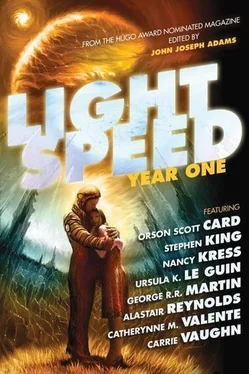John Adams - Lightspeed - Year One
Здесь есть возможность читать онлайн «John Adams - Lightspeed - Year One» весь текст электронной книги совершенно бесплатно (целиком полную версию без сокращений). В некоторых случаях можно слушать аудио, скачать через торрент в формате fb2 и присутствует краткое содержание. Год выпуска: 2011, ISBN: 2011, Издательство: Prime Books, Жанр: Фантастика и фэнтези, на английском языке. Описание произведения, (предисловие) а так же отзывы посетителей доступны на портале библиотеки ЛибКат.
- Название:Lightspeed: Year One
- Автор:
- Издательство:Prime Books
- Жанр:
- Год:2011
- ISBN:978-1607013044
- Рейтинг книги:5 / 5. Голосов: 1
-
Избранное:Добавить в избранное
- Отзывы:
-
Ваша оценка:
- 100
- 1
- 2
- 3
- 4
- 5
Lightspeed: Year One: краткое содержание, описание и аннотация
Предлагаем к чтению аннотацию, описание, краткое содержание или предисловие (зависит от того, что написал сам автор книги «Lightspeed: Year One»). Если вы не нашли необходимую информацию о книге — напишите в комментариях, мы постараемся отыскать её.
www.lightspeedmagazine.com
Lightspeed: Year One — читать онлайн бесплатно полную книгу (весь текст) целиком
Ниже представлен текст книги, разбитый по страницам. Система сохранения места последней прочитанной страницы, позволяет с удобством читать онлайн бесплатно книгу «Lightspeed: Year One», без необходимости каждый раз заново искать на чём Вы остановились. Поставьте закладку, и сможете в любой момент перейти на страницу, на которой закончили чтение.
Интервал:
Закладка:
So they strip Nico down to little more than a head and a nervous system, and plug what’s left into a tiny, hyper-agile fighter. The battle lines are being drawn far beyond conventional FTL now. The war against the reptiles will be won and lost in the N-dimensional tangle of interconnected wormhole pathways.
Wired into the fighter, Nico feels like a god with armageddon at his fingertips—not that he’s really got fingertips. He doesn’t feel much like Nico any more. He cracks a wry smile at Chokepoint’s new arrivals, gawping at the bodies in the tanks. His old memories are still in there somewhere, but they’re buried under a luminous welter of tactical programming.
Frankly, he doesn’t miss them.
They’re not fighting the reptiles any more. Turns out they were just the organic puppets of an implacable, machine-based intelligence. The puppetmasters are faster and smarter and their strategic ambitions aren’t clear. But it doesn’t concern thing-that-was-once-Nico.
After all, it’s not like machines can’t die.
Strategic Command sends him deeper. He’s forwarded to an artificial construct actually embedded in the tangle, floating on a semi-stable node like a dark thrombosis. Nico’s past caring where the station lies in relation to real space.
No one fully human can get this far—the station is staffed by bottled brains and brooding artificial intelligences. With a jolt, thing-that-was-once-Nico realises that he doesn’t mind their company. At least they’ve got their priorities right.
At the station, thing-that-was-once-Nico learns that a new offensive has opened up against the puppetmasters, even further into the tangle. It’s harder to reach, so again he must be remade. His living mind is swamped by tiny machines, who build a shining scaffold around the vulnerable architecture of his meat brain. The silvery spikes and struts mesh into a fighter no larger than a drum of oil.
He doesn’t think much about his old body, back at Chokepoint, not any more.
The puppetmasters are just a decoy. Tactical analysis reveals them to be an intrusion into the wormhole tangle from what can only be described as an adjunct dimension. The focus of the military effort shifts again.
Now the organic matter at the core of thing-that-was-once-Nico’s cybernetic mind is totally obsolete. He can’t place the exact moment when he stopped thinking with meat and started thinking with machinery, and he’s not even sure it matters now. As an organism, he was pinned like a squashed moth between two pages in the book of existence. As a machine, he can be endlessly abstracted, simulated unto the seventh simulation, encoded and pulsed across the reality-gap, ready to kill.
This he—or rather it—does.
And for a little while there is death and glory.
Up through the reality stack, level by level. By now it’s not just machines versus machines. It’s machines mapped into byzantine N-dimensional spaces, machines as ghosts of machines. The terms of engagement have become so abstract—so, frankly, higher-mathematical—that the conflict is more like a philosophical dialogue, a debate between protagonists who agree on almost everything except the most trifling, hair-splitting details.
And yet it must still be to the death—the proliferation of one self-replicating, pan-dimensional class of entities is still at the expense of the other.
When did it begin? Where did it begin? Why?
Such questions simply aren’t relevant or even answerable anymore.
All that matters is that there is an adversary, and the adversary must be destroyed.
Eventually—although even the notion of time’s passing is now distinctly moot—the war turns orthogonal. The reality stack is itself but one compacted laminate of something larger, so the warring entities traverse mind-wrenching chasms of meta-dimensional structure, their minds in constant, self-evolving flux as the bedrock of reality shifts and squirms beneath them.
And at last the shape of the enemy becomes clear.
The enemy is vast. The enemy is inexorably slow. As its peripheries are mapped, it gradually emerges that the enemy is a class of intellect that the machines barely have the tools to recognise, let alone understand.
It’s organic.
It is multi-form and multi-variant. It hasn’t been engineered or designed. It’s messy and contingent, originating from the surface of a structure, a higher-mathematical object. It’s but one of several drifting on geodesic trajectories through what might loosely be termed “space.” Arcane fluids slosh around on the surface of this object, and the whole thing is gloved in a kind of gas. The enemy requires technology, not just to sustain itself, but to propagate its warlike ambitions.
Triumph over the organic is a cosmic destiny the machines have been pursuing now through countless instantiations. But to kill the enemy now, without probing deeper into its nature, would be both inefficient and unsubtle. It would waste machines that could be spared if the enemy’s weaknesses were better understood. And what better way to probe those weaknesses than to create another kind of living thing, an army of puppet organisms, and send that army into battle? The puppets may not win, but they will force the adversary to stretch itself, to expose aspects of itself now hidden.
And so they are sent. Volunteers, technically—although the concept of “volunteer” implies a straightforward altruism difficult to correlate with the workings of the machines’ multi-dimensional decision-making matrices. The flesh is grown in huge hangars full of glowing green vats, then shaped into organisms similar but not identical to the enemy. Into those vast, mindless bodies are decanted the thin, gruel-like remains of compactified machine intellects. It’s not really anything the machines would recognise as intelligence, but it gets the job done.
Memories kindle briefly back to life as compactification processes shuffle through ancient data, untouched for subjective millenia, searching for anything that might offer a strategic advantage. Among the fleeting sensations, the flickering visions, one of the machines recalls standing in line under an electric-yellow sky, waiting for something. It hears the crackle of an electro-prod, smells the black char of burning tissue.
The machine hesitates for a moment, then deletes the memory. Its new green-scaled puppet body is ready, it has work to do.
The enemy must die.
About the Contributors
Stephen Baxterwas born in Liverpool, England. With a background in math and engineering, he is the author of over fifty novels and over a hundred published short stories. He has collaborated with Sir Arthur C. Clarke and is working on a new collaboration with Sir Terry Pratchett. Among his awards are BSFA awards, the Philip K. Dick Award, and Locus, Asimov, and Analog awards. His latest novel is Stone Spring , first of a new series.
Tobias S. Buckellis a Caribbean-born speculative fiction writer who grew up in Grenada, the British Virgin Islands, and the U.S. Virgin Islands. He has written four novels, including the New York Times bestseller Halo: The Cole Protocol . He currently lives in Ohio with a pair of dogs, a pair of cats, twin daughters, and his wife.
Orson Scott Cardis the bestselling author of more than forty novels, including Ender’s Game , which was a winner of both the Hugo and Nebula Awards. The sequel, Speaker for the Dead , also won both awards, making Card the only author to have captured science fiction’s two most coveted prizes in consecutive years. His most recent books include another entry in the Enderverse, Ender in Exile , and the first of a new young adult series, Pathfinder . His latest book is The Lost Gates , the first volume of a new fantasy series.
Читать дальшеИнтервал:
Закладка:
Похожие книги на «Lightspeed: Year One»
Представляем Вашему вниманию похожие книги на «Lightspeed: Year One» списком для выбора. Мы отобрали схожую по названию и смыслу литературу в надежде предоставить читателям больше вариантов отыскать новые, интересные, ещё непрочитанные произведения.
Обсуждение, отзывы о книге «Lightspeed: Year One» и просто собственные мнения читателей. Оставьте ваши комментарии, напишите, что Вы думаете о произведении, его смысле или главных героях. Укажите что конкретно понравилось, а что нет, и почему Вы так считаете.












